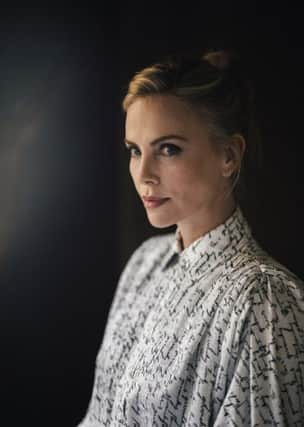Charlize Theron on putting on 50 pounds of weight for film role


So she wasn’t about to climb into a fat suit for Tully, her second collaboration, after Young Adult, with director Jason Reitman and screenwriter Diablo Cody.
For the film, which opens today, Theron gained nearly 50 pounds to play Marlo, an end-of-her-tether mother of three (including an infant) who reluctantly accepts her wealthy brother’s gift of a night nurse, the Mary Poppins-esque Tully (Mackenzie Davis).
Advertisement
Hide AdBut it was Theron’s experiences with her adopted children – a son, Jackson, six, and a daughter, August, two – that most helped her.
“I just remember my body and my brain not really being on the same page,” she says. “That period, especially the first couple of months, is so all-consuming that you have these small moments where you realise how far you have pushed yourself aside just to make sure this little thing stays alive.”
During a telephone interview from Los Angeles, Theron, 42, discusses her onscreen transformation, the demands of motherhood and her fight for women’s rights in the movie industry. Here are edited excerpts from the conversation.
Did Diablo Cody write this role with you in mind?
I don’t think Diablo writes like that. I think the writing for her is very therapeutic, and she had just had her third child, and she sat down at a desk to write about what she was feeling because it was so overwhelming, and the script kind of poured out of her.
How young were your own children when you first read it?
My second kid was around six or seven months old, so I was just coming out of that tunnel place where you’re kind of feeling overwhelmed, and I had just seen a sliver of light.
Was the physical transformation necessary?
I don’t know how to play a woman who’s giving birth to her third child and then having to live in the aftermath of that body without doing it. Jason knows me and how I work and my process, and we both knew it had to happen. For me, it’s a way to get closer to the character and to try to feel as much as I possibly can.
And that helped you tap into Marlo’s emotional state.
Advertisement
Hide AdWell, I thought I was just going to start with the physical transformation, and then I would get to her inner workings. And what ended up happening was very much like this character, and I think a lot of women. It really affects your mood and your brain when you’re eating that much processed food and sugar, and for the first time in my life I went into a really, really deep depression.
You co-parent with your mother, Gerda.
Yeah, she lives right up the road from us and is very, very involved in my kids’ lives. And it’s a relationship that’s very different from the relationship that I have with my kids. It’s one that I don’t think we talk enough about or value enough. We get so restricted in our thoughts of a mother and a father and what a family should look like, and we neglect other relationships like that of a parent, a grandparent and a child, a grandchild.
Advertisement
Hide AdShifting gears, any thoughts about #MeToo and your own experiences with sexual harassment?
I have definitely felt powerless in situations because of the power that some men in my career have placed in the space that I had to work in. Or even prior to working – just trying to get a job or going out for an audition and having that feeling of: “Oh, OK, I get it. You’re letting me know that you’re the boss in the room, and my dignity is maybe not so important in this moment.”
I feel in my core that there’s something about this movement that’s going to stick, and we’re just not going to go backward. I wish it was there 20 years ago when I started. I wish there was a way to speak about this stuff and not be judged or be shamed, or even just believed.
You demanded – and received – equal pay to Chris Hemsworth in The Huntsman: Winter’s War.
I’ve had to put my foot down and say, “Look, if we’re going to make another movie, then we have to do it fair.” The problem is that I know that I am not representative in my industry, and what I can do is not necessarily what every other woman out there can do. They might have families that they have to feed, and the fear of being replaced makes it not a choice. It’s those women that I want to help. And that’s where we have to change things.
© NYT 2018
Kathryn Shattuck
Tully is released in cinemas today